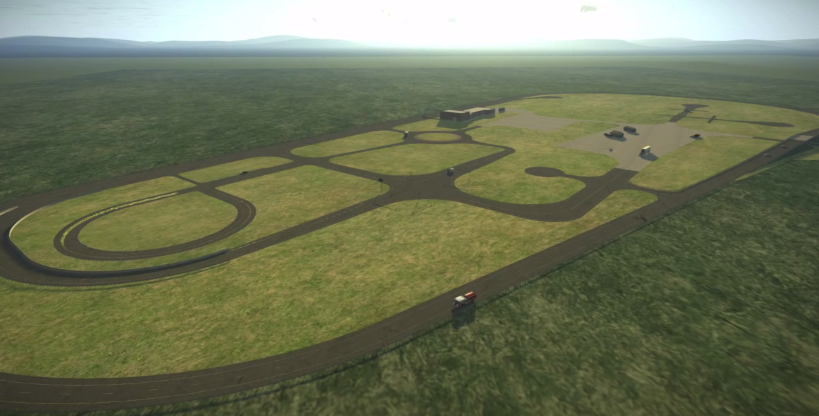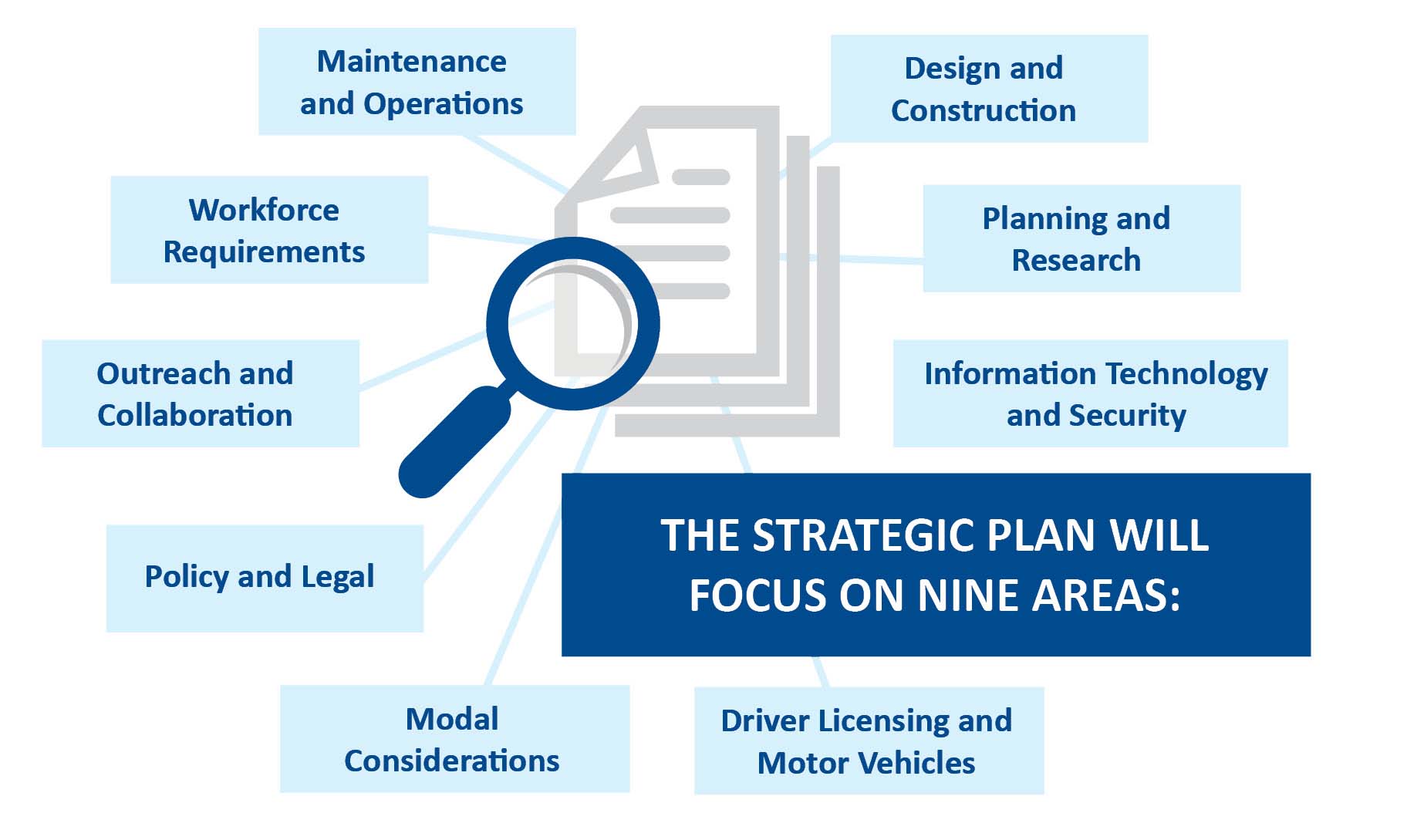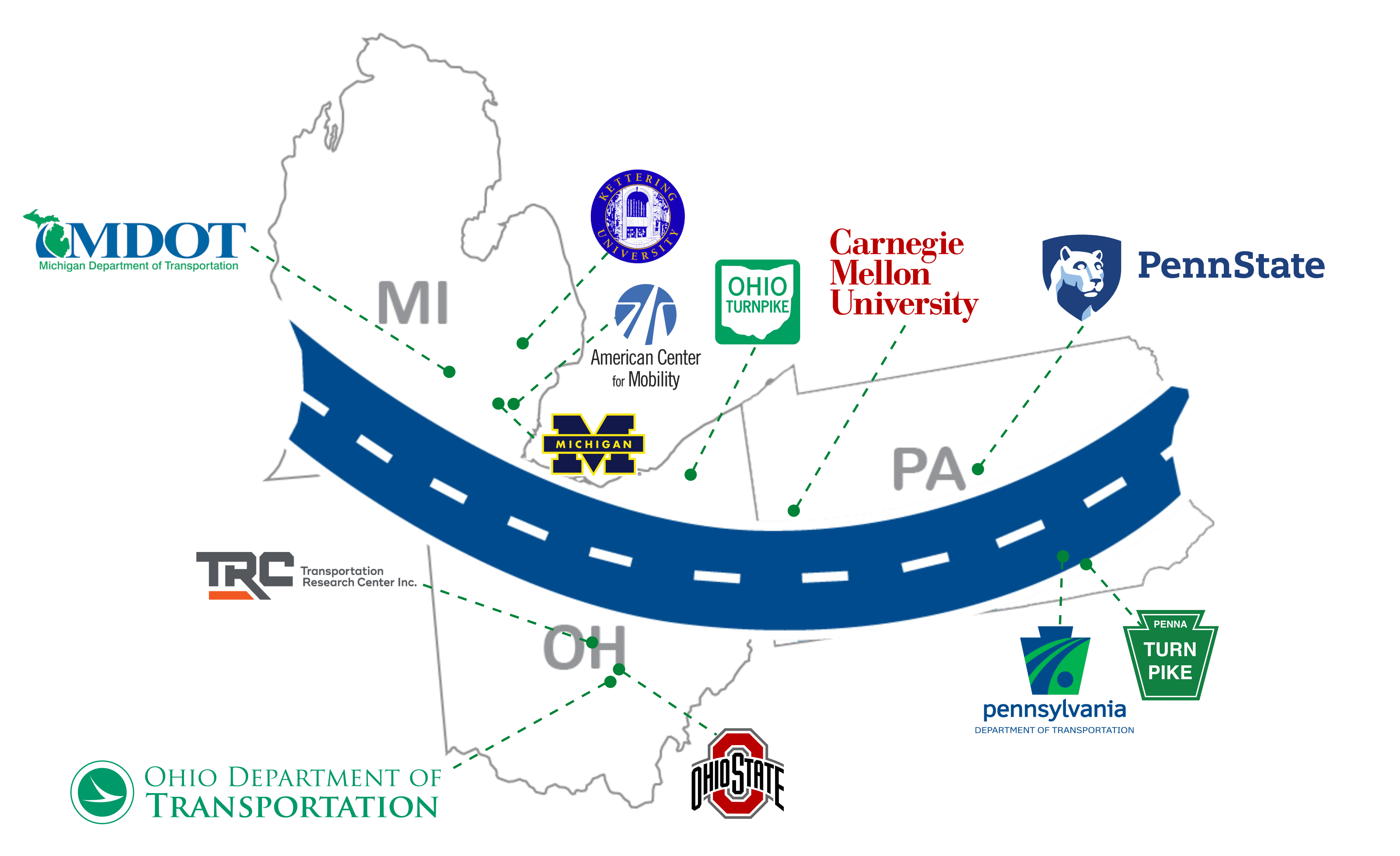CAV Initiatives
PennSTART
 PennSTART Test Track
PennSTART Test Track
The Pennsylvania Department of Transportation (PennDOT) and Pennsylvania Turnpike Commission (PTC) are partnering to explore and advance PennSTART, a-state-of-the-art training and testing facility to address the transportation safety and operational needs of Pennsylvania and the Mid-Atlantic Region. The facility is anticipated to be operational as early as 2024 and will benefit emergency responders, transportation organizations, and research institutions. PennSTART will address safety training and research needs in six key areas: traffic incident management (TIM); tolling and intelligent transportation systems (ITS) technology; work zones; commercial vehicles; transit vehicles; and connected and automated vehicles.
Keep up to date with the project at https://pennstart.org/.
Examples of technologies for which safety and operational testing, as well as training, could be conducted at the new facility could include:
- TIM training;
- Testing and hands-on training for new ITS, tolling, and signal equipment;
- Safe, simulated training for higher-speed and mobile work-zone operations;
- Safety certification training opportunities;
- Simulated environments for temporary traffic control device testing and evaluation;
- Smart truck-parking applications and other opportunities for commercial vehicle technology partnerships; and
- Controlled environments to test various connected and automated vehicle technologies for infrastructure equipment, fleets, and other applications.
Connected and Autonomous Vehicle 2040 Vision
In 2013, PennDOT commissioned a one-year project with CMU to assess the implications of connected and autonomous vehicles on the management and operation of the state's surface transportation system. Using a design year of 2040, the researcher evaluated the implications on highway infrastructure within the Pittsburgh region. The
2040 Vision (PDF) explored the impacts of connected and autonomous vehicles on design and investment decisions, communication devices investment, real‐time data usage, existing infrastructure, workforce training needs, driver licensing and freight flow as they relate to PennDOT.
Statewide Connected and Automated Vehicle Strategic Plan
The
Statewide Connected and Automated Vehicle Strategic Plan will assist Pennsylvania in preparing for connected and automated vehicle advancements. The Strategic Plan will look at all of Pennsylvania, build upon existing research, identify the steps PennDOT should take to prepare for these technologies, define a comprehensive set of focused, reasonable and deployable applications, consider various levels of investment, and provide PennDOT with critical missing data and information pertaining to the early deployment of connected and automated vehicles The Strategic Plan will be used as the foundation for all policy and procedural decisions relating to connected and automated vehicles. Ultimately, the Strategic Plan will be designed to be a “living document” to account for new information and advances.

Smart Belt Coalition

PennDOT, PTC, Ohio DOT, the Ohio Turnpike, and Michigan DOT have jointly formed the Smart Belt Coalition – a first-of-its-kind collaboration – with transportation agencies and universities in Pennsylvania, Ohio, and Michigan to focus on automated and connected vehicle initiatives. The coalition brings together leaders on these technologies to support research, testing, policy, funding pursuits and deployment, as well as to share data and provide unique opportunities for private-sector testers. Key elements include:
- Establishing a high-profile, high-impact, and long-distance network for transportation innovations in connected automation.
- Supporting testing and deployment of various applications of connected and automated vehicles, including agency fleets, first responder vehicles, passenger vehicles, transit vehicles, and trucks.
- Supporting testing and deployment of other innovative and emerging technologies. Testing and operating connected and automated applications on varying terrain during all four distinct seasons of the year, leveraging unique off-roadway test facilities.
- Validating innovations across a diversity of urban and rural roadways. Sharing data for testing, research and deployment of innovative and emerging technologies. Leveraging national leading university research and current deployments of cutting-edge connected automation technology.
- Demonstrating the necessary cooperative deployment, cost, and effectiveness of supporting connected automation infrastructure among multiple modes, states, agencies, and private companies.
Key projects to date include:
Truck Platooning Pilot
In October 2020, the Smart Belt Coalition performed an inter-state truck platooning pilot from Pittsburgh to Detroit. The SBC and Locomation demonstrated the agency coordination and administrative and procedural requirements necessary for a truck platooning system to operate continuously through the three states. This effort will result in a "lessons learned" document on the steps needed to facilitate a truck platooning and automated driving system operation across jurisdictional boundaries.
CAV Hotspots
CAV Hotspots is a project that aims to explore the potential for early market penetration of connected and automated vehicles (CAVs) across Pennsylvania. The project has developed use cases and a scoring methodology to evaluate the likelihood of CAV adoption in different areas of the state. Use cases selected for the project include automated trucking, PPDs, ADAS for personal-use passenger vehicles, vehicle-to-infrastructure transit, and infrastructure-to-vehicle information systems. The project's goal is to identify CAV "hotspots" where early adoption is most likely and to provide insights into how these technologies can be integrated into Pennsylvania's transportation system.
AV Incident Response Plan
AV Incident Response Plan is a project that will improve safety in case of automated vehicle (AV) and personal delivery device (PDD) incidents in Pennsylvania. The project aims to ensure that all reportable incidents involving AVs and PDDs are appropriately communicated to PennDOT and other stakeholders, and that communications are maintained to facilitate a coordinated response effort.
To achieve this goal, the project includes a communication flow chart that outlines communication channels from AV Incident Detection to Post-Incident Activities. The project also involves the development of a mobile application called the Pennsylvania AV Incident Response Field Guide. This application is designed to equip all first responders with appropriate incident response considerations to enhance safety when responding to an AV/PDD incident.
The app ensures that all responders are aware of appropriate incident response considerations, and provides guidance on how to safely respond to an AV/PDD incident. It also ensures that PennDOT is aware of all reportable AV/PDD incidents, enabling them to take appropriate action and facilitate interagency coordination efforts.